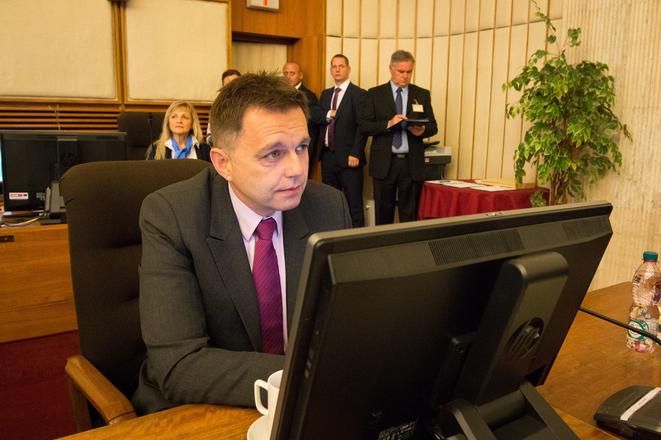JUST AS Slovakia was looking forward to balancing its state budget, albeit later than planned, Eurostat has poured cold water on official statistics by revealing that the public finance deficit for 2015 was well above target and much higher than the Finance Ministry’s figures. Finance Minister Peter Kažimír expressed surprise, but economists and analysts noted that in fact previously highlighted risks had come to pass.
The public finance deficit last year was at 2.97 percent of GDP, Eurostat reported in its regular spring notification on April 21. In doing so, it refused to acknowledge some of the payments that the government had booked as revenue. Kažimír said he was surprised, adding that in the past such operations were never questioned by Eurostat.
“Such surprises from the side of Eurostat at the very last moment are not fair and we will insist on more discussions about this topic,” he said. Slovakia entered notification proceedings with a deficit of 2.56 percent.
Despite consultation, Eurostat did not acknowledge as revenue repayments of more than €117 million in financial aid from rail firm ZSSK Cargo, or payments from the State Fund for Development of Housing (ŠFRB) of almost €200 million.
Analysts see Slovakia’s fiscal deficit of 2.97 percent of GDP as a failure to meet the 2.49 percent targeted in the state budget. The Budgetary Responsibility Council (RRZ) pointed out that it had warned in its evaluation last year that the budget, as approved, contained significant risks of negative outcomes.
“A major part of identified risks have materialised, or even exceeded the estimated level and largely contributed to the deficit’s worsening,” said Ľudovít Odór of RRZ.
Compared with 2014, Slovakia’s fiscal deficit increased and if Greece, which continues to struggle with its major financial problems, is omitted, Slovakia is the only member country of the European Union (EU) whose deficit increased year on year.
Slovakia entered the notification negotiations with a deficit of 2.56 percent, including corrections of 0.3 percent of GDP related to drawing of EU funds on which the Finance Ministry did not have any influence, Finance Ministry spokeswoman Alexandra Gogová told The Slovak Spectator.
The Finance Ministry highlighted the improvement in Slovakia’s debt, which declined to 52.01 percent of GDP last year, against 53.90 of GDP in 2014. In the upcoming years, debt is expected to decrease below 50 percent.
Missed opportunity
Economic analysts perceive the higher-than-planned deficit as a missed opportunity, given the sound economic growth of 3.6 percent as well as improved collection of taxes Slovakia experienced last year. They also describe take the plan of Prime Minister Robert Fico’s current government, to achieve a balanced state budget, albeit postponed by another two years, as unrealistic.
“Alas, the deficit is of no surprise,” Radovan Ďurana of the Institute for Economic and Social Studies (INESS) think tank told The Slovak Spectator. “Already during the previous year the cabinet showed that what it really cares about is keeping the deficit below 3 percent and not getting near a balanced budget.”
Ďurana recalled that the Budgetary Responsibility Council (RRZ) had warned about the risks and that the cabinet should have prepared and created reserves for the scenario which has actually materialised. He also sees low interest rates on financial markets and thus cheap borrowing as being behind the high deficit.
The analysts agree that the cabinet used the massive increase in revenues during recent years to increase expenditures and not to reduce the deficit. Odór specified that expenditures exceeded the plan by €737 million last year.
Next budgets
The target of this year’s public finances, when the deficit is projected at 1.93 percent, remains unchanged, according to the Finance Ministry, because many of last year’s operations were only one-offs, while 2015 was also special in terms of spending last EU funds from the 2007-2013 programming period.
The Fico government is targeting a balanced budget by 2020, a postponement of this goal by two years from the original date of 2018. To achieve this it plans to reform rules and strengthen analytic teams at ministries and state institutions to support adoption of good decisions, according to Gogová. The government also wants to continue revising public expenditures with the aim of increasing their effectiveness, consolidation of public finances and combating tax evasion and money laundering, she added.
The analysts perceive the postponement of the balanced budget to what will be an election year as an indicator that this target will be not achieved.
“I perceive the postponement… as a de facto confession [of the government] that this goal will be not met,” Martin Reguli, analyst from the F. A. Hayek Foundation, told The Slovak Spectator. “I do not expect keeping of this obligation as realistic as priorities will probably emerge, especially in public investments and social programmes.”
Peter Goliaš of the Institute for Economic and Social Reforms (INEKO) think tank sees the inability to achieve a balanced budget as a consequence of irresponsible governance since 2014 when, in spite of the positive development of the economy, the revitalisation of public finances halted in Slovakia.
“The government has preferred bigger spending to revitalisation of public finances,” Goliaš told The Slovak Spectator. “I expect the same development also this year when instead of the planned 1.9 percent deficit we get near 3 percent.”
Vladimír Vaňo, head of CEE research at Sberbank Europe, recalled that the postponement of the balanced budget is a political decision of the sovereign government, elected in free and fair general elections, and member of the eurozone.
“One has to keep in mind though, that the external economic outlook becomes increasingly fragile and any potential deterioration in the global economic landscape would adversely affect not only the prospects for economic expansion but also for further fiscal consolidation,” said Vaňo. “In the ambiance of the increasingly vulnerable external environment it would be advisable to push for faster, rather than slower fiscal consolidation trajectory.”
Reguli also sees the government’s plan to ease the current setting of the so-called debt brake, the scheme under which when exceeding exact levels of the public debt the government must adopt certain restrictive measures, as one of things that may significantly reduce the motivation of this government to save and reach reduction of the deficit.
“This creates a risk that the government will get rid of a supervision mechanism currently keeping public finances in a healthy condition,” said Reguli.
The stable level of general public debt and its gradual decline would be the most important signal from the viewpoint of the international rating profile of Slovakia, according to Vaňo.
“Commitment to the consolidation path of gradually narrowing deficit in each of the consecutive year seems to be the most important,” Vaňo told The Slovak Spectator adding that under the current base-case scenario for the expansion of economy, even a slightly more gradual pace of fiscal consolidation might suffice to bring down the relative public debt as a share of GDP.



